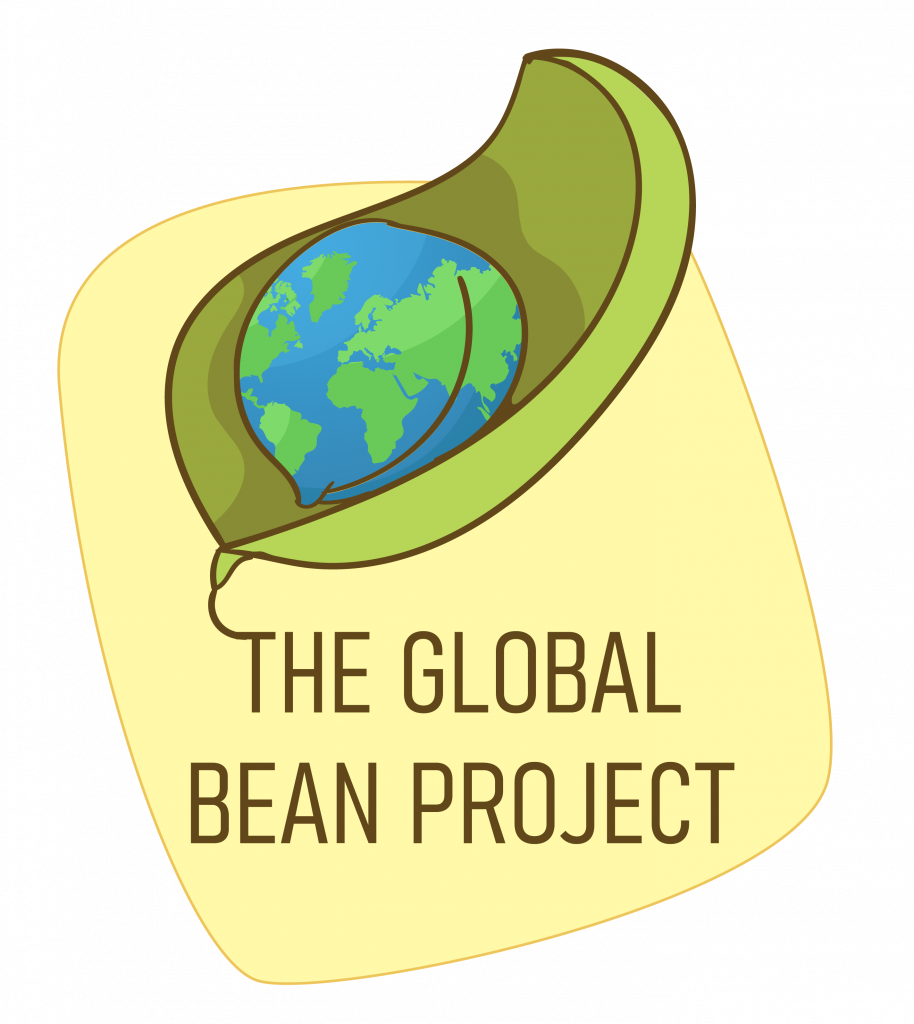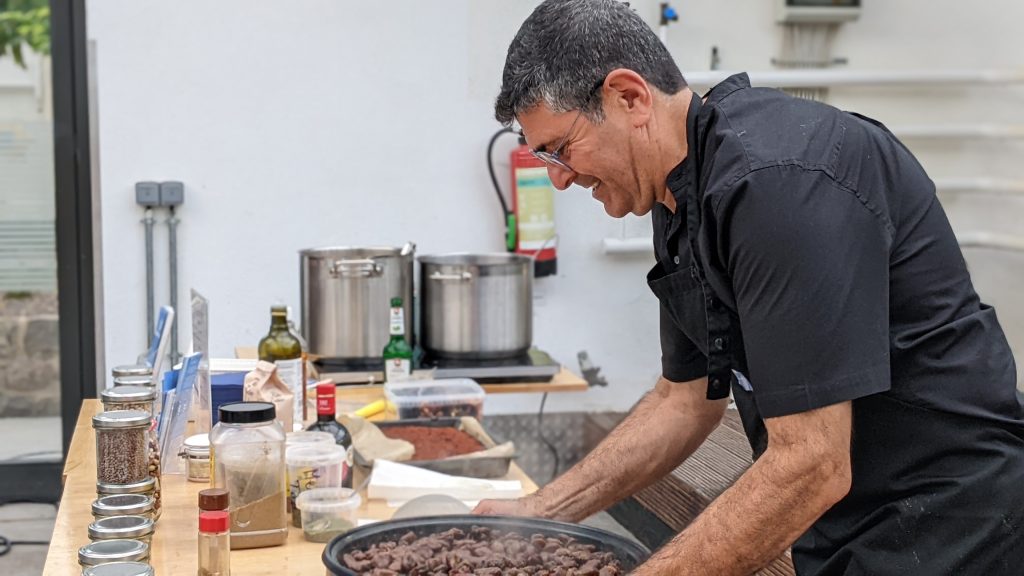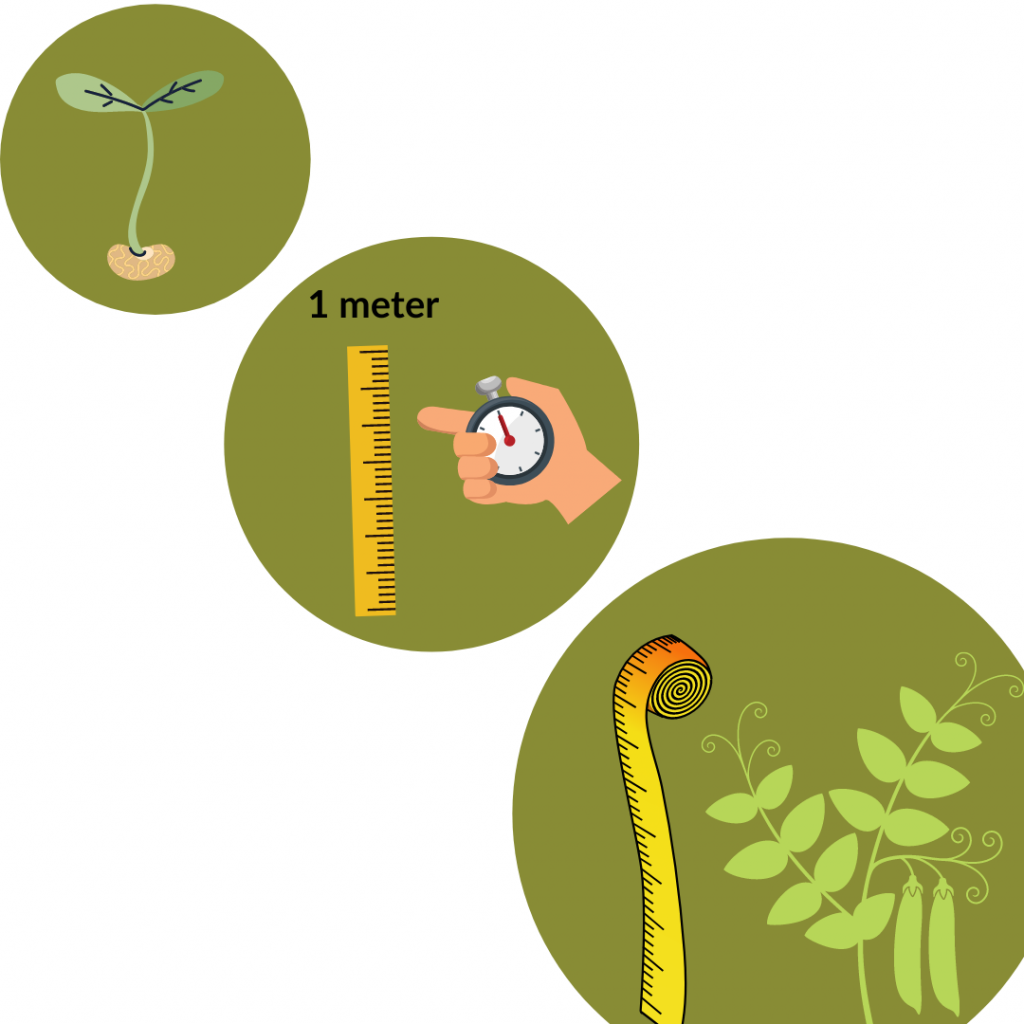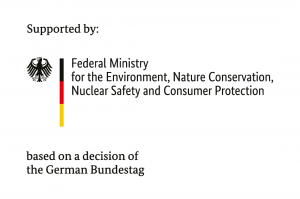Au projet Global Bean, on utilise le “broken English” comme langue européenne commune. Ce n’est pas la langue maternelle de la plupart des participants, donc n’ayez pas peur ! Certaines des publications vont aussi être traduites dans d’autres langues, et sous-titrées pour les vidéos.

More than 50 partners across Europe, as well as in Kenya and India, share and showcase inspiring experiences and practical knowledge about legume cultivation and consumption: public gardens and seed exchanges, monthly meetings and lectures, information sheets and promotional media.
NEXT GLOBAL BEAN EVENT: Legumes in community catering
Find more information and registration here.

Find all Global Bean events here.
VIDEO OF THE WEEK: Show Garden in Munich Germany 🔥
More about the Global Bean Show Gardens here
Join our ongoing “Fastest Bean” competition

Have you already sown your beans? Are you planning to? Then join the competition!
About the Global Bean Project
A European network promoting the use and cultivation of legumes
The use and cultivation of legumes have great benefits for climate change mitigation, biodiversity conservation and health. Local cultivation of legumes replaces unsustainable imports of animal feed, especially soybeans, to Europe and the use of mineral fertilizer through natural nitrogene fixation. Legumes diversify crop rotation and improve soil fertility and biodiversity. They are excellent sources of protein reducing or replacing meat consumption to the benefit of human health and the environment. Hundreds of varieties of beans, lentils, peas and other pulses are the basis of rich and diverse regional cultures and traditions of European kitchens and gardens and new innovative food products.
The Global bean project is a EU wide network of actors from civil society, enterprises, science, education and public institutions to promote and expand the use and cultivation of legumes in our kitchens, gardens and fields.
Our goal is to increase public knowledge and appreciation of the multiple environmental and health benefits of legumes. We want to provide support and motivation to include pulses in cooking and consumption habits, gardening and education. To this end, we want to popularise the professional knowledge of already existing networks and institutions in the field. We hope to establish a European Bean Club of experts and enthusiasts.
What we do and produce
- Short information sheets. Joint dissemination of information about the huge botanical, agronomic and culinary diversity of pulses and their potential, on a popular but also on a scientifically differentiated ecological and ecotrophological level.
- Monthly public lectures online and monthly exchange events of the partner community.
- Sharing cooking experiences and exchanging recipes though online cooking events held between different countries, with different participating kitchens / chefs.
- International show gardens of pulses throughout Europe and beyond with different local and exotic varieties, visiting the progress of their cultures with videos and photos.
- Practical cultivation instructions for different legumes, available online.
- Online-repository. Establishment of an open and ecological, agronomical and ecotrophically curated video and website collection and knowledge hub on the cultivation, use and preparation methods, regional diversity and ecological impacts of pulses.
- Virtual seed-exchange events, followed by shipping and exchange of real seeds.
Publications
The Legume Manifesto
Our warming world and ever greater demands on natural resources challenge us to make choices that care for our planet. Those choices start in the kitchen because, as the poet and farmer Wendell Berry said, “how we eat determines, to a considerable extent, how the world is used.” (…)
Discover the incredible diversity and abilities of legumes, and why we need more of them, for our health and our environment. Download the Legume Manifesto in PDF format.
Faba Bean Cultivation instruction
Ever wondered how to cultivate Faba Beans? Having trouble finding the perfect soil conditions?
The Global Bean’s new publication has got you covered! You will find everything, from the plant’s characteristics to best cultivation practices, the bugs and pests to watch out for, and further fun facts. For example, did you know the earliest finds of faba beans date all the way back from 6,800 to 6,000 B.C?
We’ll let you discover for yourself! Download the instruction in PDF Format here.
Info sheet: Cooking Pulses From Dry Seeds
Do you think cooking pulses is difficult? Have you ever asked yourself if and how you could prepare more of them? Are you wondering how long they should be cooked?
This hands-on information sheet on how to cook various pulse species and types from scratch contains all the tips & tricks you need to know, and will motivate you to cook them yourself! Don’t wait to start your pulse-cooking journey – Download the Information Sheet “Cooking Pulses From Dry Seeds” in PDF format.
Soybean – Edamame Cultivation instruction
From the best soil for edamame, its most common diseases, the plant’s characteristics and the best harvesting time, find everything you need to know for successfully growing Edamame in the latest Global Bean publication: Edamame cultivation instruction. Download the Soybean-Edamame Cultivation instructions in PDF format.
Chickpea Cultivation instruction
Chickpeas are known as one of the oldest cultivated plants. Did you know that they can be differentiated in two types varying in seed shape and colour? Learn all about the cultivation of chickpea in your garden in this very short and practical format format! Download the Chickpea cultivation instructions in PDF format.
Global Bean Newsletter: Subscribe here to our newsletter to receive our monthly updates.
Download our previous newsletters in PDF format:
Who are the partners?
- Schweizer Weltacker Initiativen (incl. Weltacker Attiswil) (CH)
- Weltacker Liechtenstein – Vereinigung Bäuerlicher Organisationen (VBO) (Li)
- ESSRG (Environmental Social Science Research Group) (HU)
- Bean Beat (D)
- Lebende Samen Sementes vivas (D /ES / Por / F / Marocco / Egypt)
- La Borie Noble (F)
- Slow Food Deutschland (D)
- AlVelAl Association (ES)
- Legume Hub, Donausoja (A)
- Legume Hub, Donal Murphy-Bokern (D)
- Circulos de Sementes (ES)
- Genbänkle e.V. (D)
- ALSIA (I)
- Skillebyholm (SE)
- Landwirtschaftliches Technologiezentrum Augustenberg (LTZ) (D)
- Seed Savers Network Kenya (KEN)
- terrabc.org (Verein agrikultura) (CH)
- Bohnenvielfalt am ÖBZ (Ökologisches Bildungszentrum München) (D)
- Estonian Organic Farming Foundation (EMSA) (EST)
- Université des Sciences et des Pratiques Gastronomiques (USPG) (F)
- Alliance des Cuisinier.e.s France (F)
- Parterrenet Jardin (F)
- ETA BARRERE – Protéines 64 (F)
- QFI Quendt Food Innovation KG (D)
- Verein ARCHE NOAH (A)
- Juchowo (POL)
- Rete Semi Rurali (I)
- Seed Association of Serbia (SR)
- Universidade Católica Portuguesa (UCP) (PT)
- SITO, Greek Seed Association (GR)
- The Holy Monastery of the Honorable Forerunner (GR)
- Berry Graines (F)
- Grainedechoc (F)
- INRAE (National Research Institute on for Agriculture, Food and Environment) (F)
- Ferme du Roubion (F)
- Terres Univia (F)
- FH-SWF (Fachhochschule Südwestfalen Agrarwirtschaft Soest) (D)
- Coopérative GraSaSa (F)
- ARC2020 (F / EU)
- Seeds4all (EU)
- Open House (D)
- Bluepingu e.V (Weltacker Nürnberg) (D)
- Nicolas Carton (F/ES)
- Getreidezüchtung Peter Kunz (D)
- Heldenküche (D)
- Weltacker Landshut (D)
- SKUAST-Kashmir (IN)
- Global field India – Edible Routes (IN)
- Slow Food International
- Solhatt økologisk hagebruk (NO)
- Ecological movement “Frame of Life”(SR)
- Susan Young (UK)
- Slow Food USA (USA)
- Eva Kemp (D)
Becoming a partner
Are you an NGO, enterprise, organisation or institution working towards the promotion of the cultivation and use of legumes? Would you like to connect and share your experience in an international context? Then contact bean[at]2000m2.eu to join our partners’ network!
Any questions?
Get in touch with Lisa Hoffmann via bean[at]2000m2.eu.
Further contact details: Foundation on Future Farming / Zukunftsstiftung Landwirtschaft
Berlin office, Marienstr. 19-20, 10117 Berlin, +49 30 2848 2320
Who is behind the project?
The project is coordinated by the Zukunftsstiftung Landwirtschaft (Foundation on Future Farming, ZSL), who is running a 2000m² “global plot” show garden in Berlin and coordinates the collaboration of 9 additional sites working along the same concept (see www.2000m2.de). The ZSL also runs information campaigns on global agriculture, the Common Agricultural Policy of the EU and agro-ecology. This project is funded by the German Ministry for the Environment, Nature Conservation, Nuclear Safety and Consumer Protection’s EURopean ENvironment Initiative.


